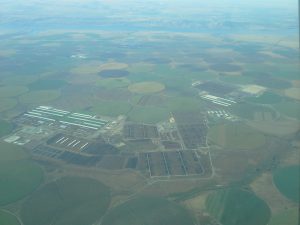
The 2017 Oregon Legislative Session is over. Adjourning on Friday, July 7 in a flurry of activity, the Legislature’s final actions included some unexpected surprises and good news. But these positive outcomes were tempered by what was overall a very tough session dominated by jostling over scarce funds and massive budget shortfalls, and the continuing inability of the Legislature to stand up to Big Ag interests that fight against common-sense rules to level the playing field for Oregon’s smaller farmers.
Because of the state’s unclear budget picture, it was not until the very final days of the session that funding levels for a number of programs were settled on by top legislative leaders. The following is a wrap up on a number of key bills FoFF either worked on or tracked throughout the session, while this Capital Press article covers additional farm related bills.
Wins:

Farm to School – The Oregon Farm to School program, though it has steadily grown over the years, started out the session facing deep cuts or elimination in the 2017-19 biennium. However, in the final days of the session, Legislators kept funding stable and allocated $4.5 million over the next two years for the popular grant program that gets locally grown and processed foods into school meal programs across Oregon.
Farm Direct Nutrition – In an unexpected turn, the Legislature substantially boosted funding available for Farm Direct Nutrition programs that help low-income seniors and young mothers with children buy food directly from farmers markets and farm stands. At the beginning of the session, food security and farmers market advocates were fighting just to hold on to $300,000 in one-time funding that had been provided in 2015. However, in the final days of the session, Legislators allocated $1.5 million for this important program that directly supports small farms and connects many low-income Oregonians to healthy, farm fresh foods.
On-Farm Cider – Oregon apple and pear growers engaged in the burgeoning ‘hard’ cider industry scored a win this session by passing a bill to treat on-farm cideries the same as vineyards. That means that farms with more than 15 acres of apple or pear orchards will be able to bottle and sell cider on-farm, offer tastings, serve food, and engage in agritourism opportunities new to the cider industry. The bill goes into effect on January 1, 2018.
Farm Direct Eggs – Farm direct egg producers will now be able to legally sell ‘ungraded’ eggs at farmers’ markets, farms stands, through CSA’s (Community Supported Agriculture), and at roadside stands. Traditional egg grading requirements are intended for mass production systems that aim at uniformity in size, color and weight of eggs. But these grading requirements have little relevance for farm direct producers that interface with customers directly and often mix and match egg grades, colors and sizes to appeal to customer interest. The new law will make the common practice of selling ‘ungraded’ eggs farm direct fully legal as long as eggs have been candled to inspect for internal flaws. ‘Candling’ is defined in Oregon law as ‘the examination of the interior of eggs by the use of transmitted light used in a partially dark room or place.’
Losses:

Rules for Genetically Engineered Crops – For the fourth session since 2013, the Oregon Legislature failed to pass bills to prevent problems associated with genetically engineered (GE) crops. Hearings were held in both the House and Senate on bills to restore local control to communities that adopt measures to protect farmers from GE crop contamination. The Legislature banned such local measures back in 2013 in favor of statewide regulations for GE crops as part of a so-called ‘grand bargain’ relating to tax and public employee pension issues. However, statewide regulations for problematic GE crops have yet to be adopted, leaving Oregon farmers unprotected from GE contamination risks. A separate bill that would have held patent holders of GE seeds and traits financially liable if their products were found on nearby land did receive hearings in the House, but did not get to the House or Senate floor for a vote. As in past years, groups with close ties to the biotech and pesticide industries opposed common-sense rules and regulations for GE crops.
 Mega-Dairy Air Quality Rules – Legislators failed to advance a long overdue air quality program to address air contaminant emissions from a growing number of exceedingly large ‘mega’ dairies in Oregon. Advocates for small farms and clean air argued that the recent approval of a new 30,000-cow mega-dairy in Morrow County by the Oregon Departments of Environmental Quality and Agriculture necessitated moving forward with the program before air quality in the region worsens and more small dairy farms go out of business. However, even a bill that would have enacted recommendations from a stakeholder task force to create an air quality program for large dairies was opposed by the state’s largest source of dairy related air pollution, the 70,000-cow Threemile Canyon Farms, as well as other industry groups that support continued lax oversight for large corporate farming operations.
Mega-Dairy Air Quality Rules – Legislators failed to advance a long overdue air quality program to address air contaminant emissions from a growing number of exceedingly large ‘mega’ dairies in Oregon. Advocates for small farms and clean air argued that the recent approval of a new 30,000-cow mega-dairy in Morrow County by the Oregon Departments of Environmental Quality and Agriculture necessitated moving forward with the program before air quality in the region worsens and more small dairy farms go out of business. However, even a bill that would have enacted recommendations from a stakeholder task force to create an air quality program for large dairies was opposed by the state’s largest source of dairy related air pollution, the 70,000-cow Threemile Canyon Farms, as well as other industry groups that support continued lax oversight for large corporate farming operations.
Beginning Farmer Tax Credit – A proposal to create a new tax credit for landowners who agree to multi-year leases with beginning farmers did not advance this year. A likely victim of the state’s precarious budget situation, the bill was sent to a committee that never even scheduled a hearing on it. While there generally seems to be agreement in Salem that more needs to be done to help out beginning farmers, new tax credits were not in the cards for this session of tough budgetary decisions. Ultimately, the final tax credit bill of the session phased out a number of existing tax credits, allowing some to expire and capping others, to contain costs. The beginning farmer tax credit concept may have to wait until the state is on better financial footing. This is something we will continue to push for.
 Pesticide Use Reform – Bills requiring advanced notice of aerial pesticide spraying to help protect farmers and rural residents from pesticide drift and crop damage failed under stiff opposition from the timber industry and agribusiness groups with ties to pesticide manufacturers. Other legislation to protect pollinators by restricting use of neonicotinoid pesticides to licensed applicators failed due to opposition from some ag industry groups. Neonicotinoid pesticides have been linked to bee die-offs in Oregon in recent years.
Pesticide Use Reform – Bills requiring advanced notice of aerial pesticide spraying to help protect farmers and rural residents from pesticide drift and crop damage failed under stiff opposition from the timber industry and agribusiness groups with ties to pesticide manufacturers. Other legislation to protect pollinators by restricting use of neonicotinoid pesticides to licensed applicators failed due to opposition from some ag industry groups. Neonicotinoid pesticides have been linked to bee die-offs in Oregon in recent years.
Mixed Results:
OSU Statewide Public Service Program Funding – OSU Extension and Agricultural Experiment Stations, which support farmers with research and training needs, are part of the OSU Statewide Public Service Programs. In 2015, these programs received a significant funding boost and new positions, including those supporting small farms and community food systems, were filled. To maintain continuing service levels and staffing for 2017-19, the program needed an additional $9.4 million. In the end, the Legislature provided only $5.6 million. OSU believes that over the next biennium, this shortfall will result in the loss of 17 full-time positions, which could impact OSU Extension programs and Agricultural Experiment Station research important for farmers around the state.
Manure Digester Tax Credit – The manure digester tax credit was first created in 2007 and was intended to encourage diaries to convert manure into energy. It was supposed to expire at the end of 2017. While ostensibly available to dairies of all sizes, the economics and practical considerations for digesters – including that they require lots of animals in confinement to produce enough manure to be even semi-economical – have meant that most of the money for this tax credit has flowed to the state’s largest confinement diary operation, Threemile Canyon Farms. At its peak in 2014 and 2015, this tax credit was costing the state over $4 million/year. In 2016, with little discussion, the Legislature extended it until the end of 2021 with no cost caps and little agency oversight. Because Oregon lacks an air emissions program to address pollution from large dairies (see above), in addition to the state’s massive budget shortfall this year, it seemed possible that this tax credit could be eliminated or substantially reformed. In the end, the Legislature capped the tax credit at $10 million per biennium moving forward and rejected proposals to extend it until 2024. Additionally, it will now be managed by the Oregon Department of Agriculture, rather than the Oregon Department of Energy. It is unclear how this change will impact the administration of the tax credit, but the General Manager of Threemile Canyon Farms, the largest recipient of the tax credit, sits on the Oregon Board of Agriculture, which advises the Oregon Department of Agriculture. While capping the tax credit and declining to extend the sunset date further are good outcomes, it is unfortunate that Oregon will spend up to $5 million annually on this tax credit over the next several years, with much of the money going to help Oregon’s largest dairy operation with manure management. This money would be much better spent investing in beginning farmer programs where there is a well-documented need for greater public support.
Agricultural Heritage Program – In the final days of the session, the Legislature approved a new program aimed at offering grants to help with farm succession planning and farmland protection strategies like working lands easements. This type of funding could potentially be used to help land trusts or Soil and Water Conservation Districts protect farmland at risk of development, and could also potentially help with beginning farmer access to land if funds are targeted to do so. However, the bill passed by the Legislature didn’t actually provide money for grants in the near term. Funding over the next two years will instead go to set up a new permanent ‘Agricultural Heritage Commission’ that will be tasked with developing program rules and priorities and reviewing future grant proposals. Funding for the grants and farmland protection strategies will have to be sought in future years. Because program priorities will be set by the as-of-yet-unnamed Commission, it is not yet clear what projects would be supported if or when money becomes available in the future. If the program priorities are not clear, or the Commission makeup is flawed, future public funds could end being poorly spent.
Looking ahead:
Now that the 2017 Oregon Legislative Session is over, there will be a number of things to watch and monitor moving forward including:
- How will OSU manage a funding shortfall that could lead to the loss of up to 17 positions in the OSU Statewide Public Service Programs?
- Who will be appointed to the new Agricultural Heritage Commission and what priorities will they set?
- Will Oregon address long-standing tax and pension reform issues over the next two years, or will we come into 2019 with another budget crisis?
- How much money will the state spend on the manure digester tax credit in coming years, and who will be the biggest beneficiary?
- As a new 30,000 cow mega-dairy grows to full capacity in the coming year, will the Legislature finally act on the need to regulate air emissions from these huge operations?
- Will it take another crisis, like the Oregon GE wheat escape in 2013, before the Legislature takes steps to protect farmers whose livelihoods are at risk from GE contamination?
We will be tracking these and other issues in the coming months, but for now, this is the last edition of ‘Muckboots in the Capitol’ until we get closer to the next Legislative Session.
Announcing FoFF’s Corporate Ag Watch Blog
While ‘Muckboots in the Capitol’ will take a hiatus until the next Legislative Session, issues around money and politics that help shape what state policy makers decide aren’t going away. That’s why we are launching our new Corporate Ag Watch Blog to expose the influence that large corporate agri-business interests have at our State Capitol. The first edition is already posted – we hope you enjoy it!
